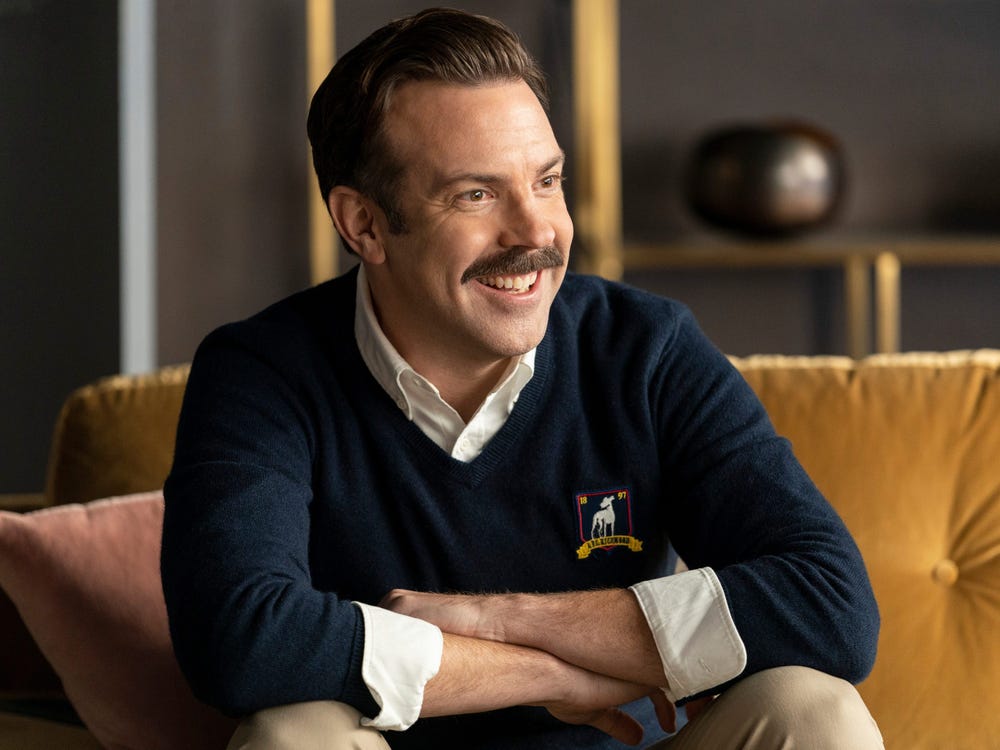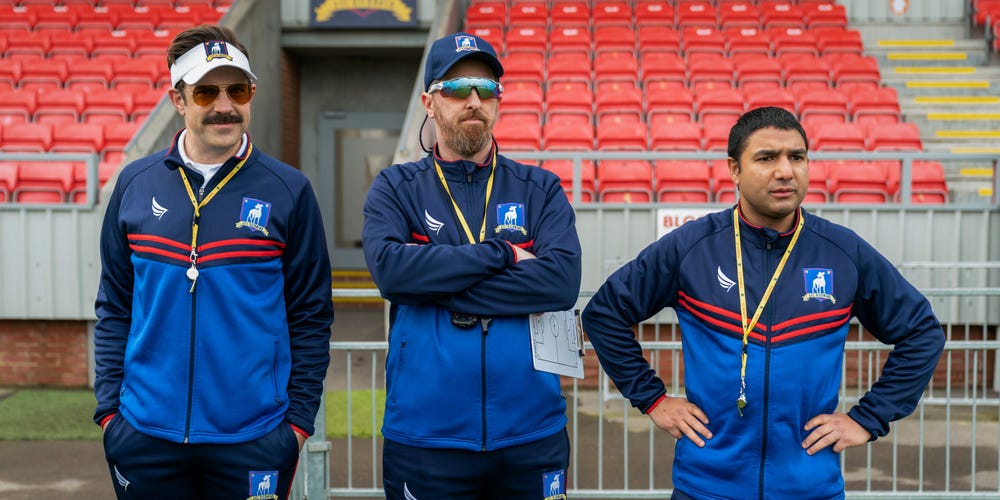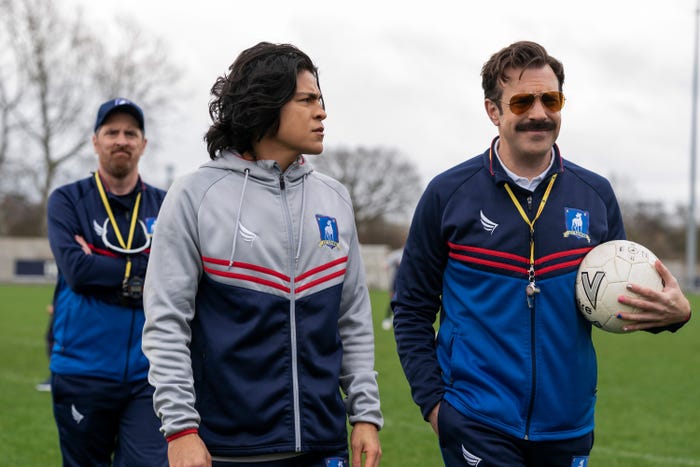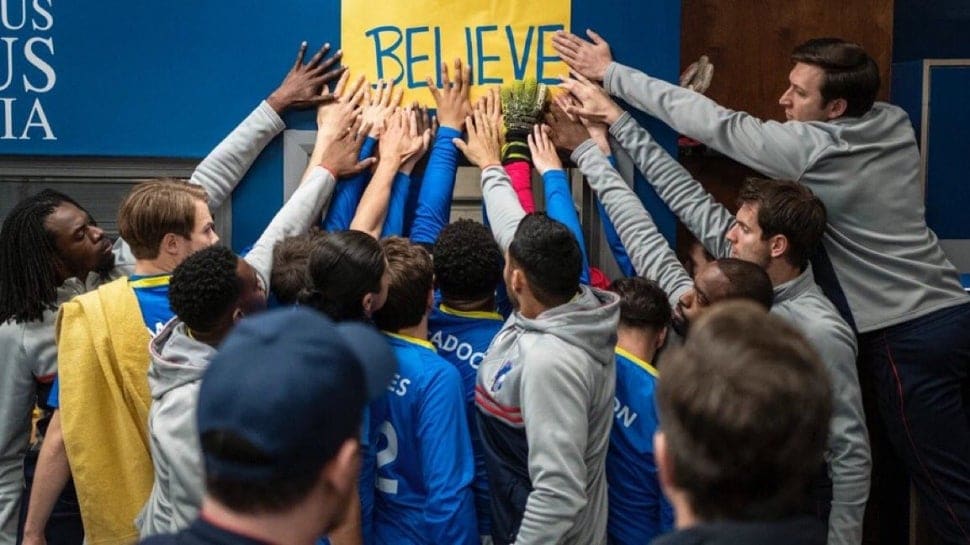Ted Lasso is a spin-off of a priceless and hilarious NBC commercial about the life of Ted, a fictional American football coach hired to coach an English Premier League football club in London. The critically acclaimed show, starring Jason Sudeikis as Ted, has racked up a ton of awards.
It took me 4-5 episodes to “get it” but eventually, I had this big a-ha moment coming. Being an American football coach training an English soccer club is no different than being a product manager.
Let me explain.
A product manager and a head coach are both leaders, mini-CEOs of their product or team. Both positions need to manage many moving parts and pull team members together to achieve a common goal. The goal and the way success is measured might be different – a product manager needs to deliver key results, and a coach needs to win games – but the process of getting there is much the same.
To win a game or resolve locker room conflicts, Ted Lasso had to earn the trust of his players and the other club stakeholders, bringing them together to achieve a mutual goal.
The same goes for a product manager. No one just follows you because you’re the product manager. You need to earn the trust of your fellow engineers, account managers, sales and marketing teams, and others.
Let’s look at some examples of how Ted earned that trust and how you can apply the same strategy to your job as a product manager to achieve the same. Because I faced many of the same struggles as Ted, I’ll also offer my real-world product management examples to make the lessons more tangible.
Lesson 1: Be kind – it’s a challenging time for everyone
Season 2, Episode 10 “No Weddings and a Funeral”
“And I knew right then and there that I was never gonna let anybody get by me without understanding they might be hurting inside, you know. ‘Cause life, it’s hard. It’s real hard.” – Ted Lasso
Ted Lasso talks to the club’s psychologist about his father’s tragic death in the episode. He then explains, plain and simple, why he’s exceptionally kind to everyone, attributing it to his understanding that life is complex.
The takeaway: It’s a challenging world out there, and the world is getting crazier and crazier. We’re fighting a war, pandemic, climate change, increasing living costs, heavy commutes, or Zooming all day long. Your peers, like you, need to perform under an increasing amount of pressure and stress. While managers need to maintain a professional environment, we need to realize that people are human, and we don’t always know the other issues they are coping with.
A real-world example: I am an extremely nice person. Sometimes, my wife calls me naive and reminds me that there are people who will exploit that. When I joined Taboola, I decided to be crazily kind. I started this as an experiment because I wanted to prove that being nice pays off.
I came across an account manager who bombarded me with questions. I knew this person wasn’t trying to ruin my day and that they were under pressure to achieve their goals too. The answers I could provide would clarify the issue they were working on, so why not sit with them and help?
Of course, I know you can’t help everyone all the time as you have your own tasks, but you never know how an extra act of kindness will pay off. I can tell you that that account manager was grateful, and when I needed help securing meetings with clients, they were there for me.
Showing people compassion in their moment of need is always the way to go.

Lesson 2: Listen, hear others’ opinions and echo them
Season 1, Episode 7 “Make Rebecca Great Again”
“Ted Lasso: Thank you. Also, I read through your thoughts. They’re great. And I agree with every last one of ’em. But I can’t say this to them. Nathan Shelly: But they need to hear it. Ted Lasso: I agree. That’s why you’re gonna do it. Nathan: What? Ted Lasso: You’re givin’ the pre-game talk. And you’re readin’ em this. C’mon, it’ll be fun.”
In this scene, Nathan, the team’s quartermaster, leaves Ted a note with tips each player should hear before a crucial away game. Unlike Ted, who is new to the team, Nathan is a diehard fan and knows each player’s strengths and weaknesses, giving him a unique perspective. Knowing this, Ted insists that Nathan reads the letter to the players himself in the critical pre-game talk, usually a coach’s duty and one of the most ceremonial things any coach does. By deferring this honor to Nathan, Ted empowers and uplifts him, even though he is “just” the team’s housekeeper.
The takeaway: Leave space for others to speak their minds and keep ownership of their ideas. Yes, you’re the product manager, the “CEO of the product” but you don’t know everything. Someone else’s perspective could completely turn things around. You should leave room for others’ opinions, and when you spot a chance, give them the space and the spotlight to express themselves publicly. You’ll be amazed at how this empowers the person, builds confidence, and in the long run, improves the person’s work and the people around them.
A real-world example: At Taboola, I had a similar experience and opportunity with a dedicated employee from the India office. Formally, he worked in our Professional Services department, serving as the first point of contact for a customer in need – but he wanted to do more than that. He excelled at seeing the bigger picture and identifying valuable feedback from our customers because he looked at things through a different lens, one that was colored by the fact that he was fluent in mobile development.
He identified a procedure we could amend, reducing a specific integration phase time. We then gave him the room to announce this change, present the solution, and train the other team members. Taboola earned a more motivated employee, who later also got promoted.

Lesson 3: It’s the small things that make a difference
Season 1, Episode 2 “Biscuits”
This one played out during an entire episode, so I’ll summarize the situation. Ted and his assistant, Coach Bird, put a hand-crafted suggestion box in the locker room to give players a chance to anonymously share their suggestions and voice their complaints. Most of the players used it as an opportunity to call the coach “wanker,” only giving a negative response to this “too nice for men” method. But on one note, a of the player complained that the water pressure in the showers was weak. It was a small thing and had nothing to do with the game, but Ted and Coach Bird took care of it, earning some important and initial trust from the players.
The takeaway: Regardless of whether you’re joining a new team or have been working with the same group for years, don’t assume things are perfect as they are. There are often easy solutions to minor problems, and solving them can have a significant impact. However, if team members don’t have a way to comfortably point them out, they will fester and play out in more detrimental ways.
A real-world example: When I started working at Taboola, I amended an operational workflow that drove one of the experienced engineers crazy. Unfortunately, not everyone on the team could add a new component to our JIRA dashboard.
Thinking there must be a solution, I reached out to a coworker on the Information Systems team. We tracked down the right person and found a way to add the new components. The new process made our working environment more straightforward for everyone, and I’m sure solving the problem scored some goodwill from that engineer.

Lesson 4: Make sure you’re working as a team
Season 1, Episode 4 “For the Children”
“When it comes to locker rooms, I like ’em just like my mother’s bathing suits. I only wanna see ’em in one piece.” – Ted Lasso
There’s a noticeable and ongoing conflict between two key players, and they often argue in the locker room. The young and gifted Jamie Tartt can’t seem to get along with team captain Roy Kent, an older player in the final years of his career. The men’s disdain for each other creates negative energy, affecting the whole team and causing them to perform poorly. It takes Ted some time, but eventually, he finds a way to bring them together, completely changing team dynamics for the better.
The takeaway: Personal differences are inevitable, but they need to be dealt with when they begin impacting the team, work performance, and atmosphere. Meddling can backfire on the person trying to be the peacemaker; however, resolutions are possible if the situation is approached with thought and care. The greatest risk is when an imbalance occurs, disrupts the team, and is left unaddressed.
A real-world example: If the situation is dire, I suggest taking a formal approach and reporting the issue to a supervisor or HR. But another option I’ve personally found helpful is to address the situation in an informal, non-threatening environment.
I’ve taken team members out for coffee or lunch and, without going into detail, explained that the current situation was palpable and interfering with the team’s goals. Don’t take sides. Instead, focus on delivering the message to both peers and make sure they understand they are both responsible. In my experience, once it’s pointed out, adults realize how much their petty differences are interfering with the team, and they’ll find a way to work it.

Lesson 5: Believe in BELIEVE
This lesson unfolded over both seasons. One of the first things Ted did when arriving at Richmond AFC was to hang a sign with the word “BELIEVE” in the locker room. The motivational sign is meant to inspire them in the short-term to win a game and in the long term to achieve any dream. Believing in BELIEVE is a core value for Ted. He passionately rails against those who lack faith in his team throughout the show, and he never gives up because he believes in BELIEVE. His attitude is contagious, and by focusing on this message, his team fights to achieve the same goal – winning.
The takeaway: The same lesson can be applied to a sports team, product team, or any other team. Everyone must abide by company rules and serve the company’s needs, but if the team is bonded as they work towards a mutual goal, each person feels they have a stake in the outcome and something to work towards.
A real-world example: In my early days at Taboola, I was part of the mobile team. As a product manager, I needed to bring people from different departments (R&D, marketing, product, and professional services) to achieve a common goal. I found it helpful to remind everyone of the technical and business milestones we needed to accomplish at daily meetings and during monthly planning meetings. Keeping the goal front and center and making everyone believe in believing they can achieve anything is what led to our success.
We can all learn from Ted
I believe that a product manager’s heart and strength are working with people and driving them. Implementing the latest product methodologies can help, but the people you work with will be the ones who help you move the ship.
Consider onboarding and applying these lessons fully, but if not, at least try to understand their roots, the conflicts they represent, and the fact that having the right attitude can make all the difference. You can follow in Ted’s footsteps and solve problems the Lasso way, or you can come up with your own solutions.
While I revealed some things about the show, and there are some spoilers here, there’s a lot more to learn from the fearless Ted Lasso. Go watch the show!
Every once in a while, you stumble across a TV series that reflects aspects of your personal and professional life. That’s what happened when I saw Apple TV+’s Ted Lasso.